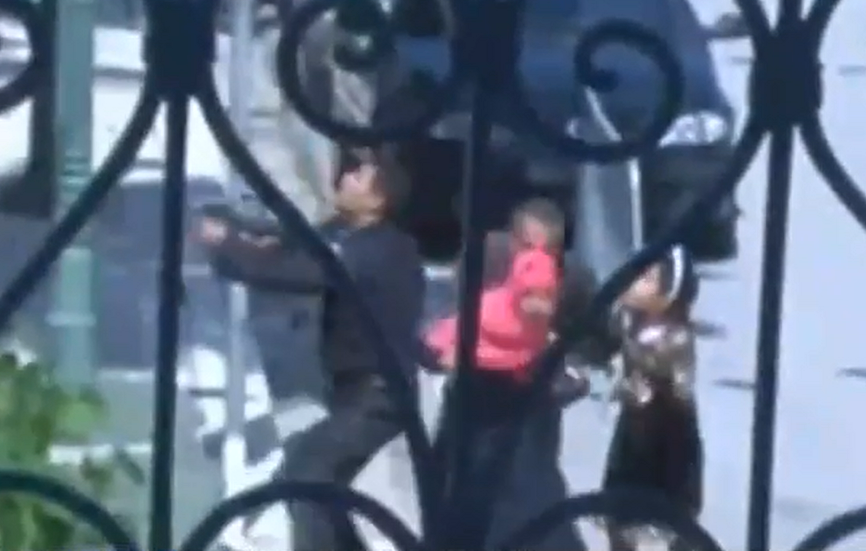
TUNIS, Tunisia — The Islamic State group has issued a statement claiming responsibility for the deadly attack on Tunisia’s national museum that killed 23 people, mostly tourists.
Thursday’s statement described the attack as a “blessed invasion of one of the dens of infidels and vice in Muslim Tunisia,” and appeared on a forum that carries messages from the group.
The U.S.-based SITE Intelligence Group also announced that IS had claimed Wednseday’s attack.
THIS IS A BREAKING NEWS UPDATE. Check back soon for further information. AP’s earlier story is below:
Tunisian security forces arrested nine people Thursday in connection with the attack on the National Bardo Museum that left 23 people dead, scores of tourists wounded and upended the country’s struggling tourism industry, authorities said.
Five of those arrested were directly connected to Wednesday’s attack by two gunmen who were later slain by police, the president’s office said in statement Thursday. The other four suspects were arrested in central Tunisia and were part of a cell supporting those involved, it said.
No group has claimed responsibility for the attack on the museum housing Roman artifacts in Tunis – the worst at a tourist site in Tunisia in years. The deaths of so many tourists prompted a leading Italian cruise ship line to announce Thursday it was canceling all stops in Tunisia indefinitely.
One of the slain gunmen was known to intelligence services, but no formal links to a particular extremist group have been established, the prime minister said.
Prime Minister Habib Essid told France’s RTL radio that Tunisia was working with other countries to learn more about the slain attackers, identified as Yassine Laabidi and Hatem Khachnaoui. He said Laabidi had been flagged to intelligence, although not for “anything special.”
Tunisia has faced scattered extremist violence, and a disproportionately large number of Tunisians have joined Islamic State fighters in Syria and Iraq.
Razor wire ringed the museum Thursday and security forces guarded major thoroughfares in Tunis, the capital.
According to survivors and witnesses, two or more gunmen attacked the museum wielding assault rifles and began gunning down tourists in front of a row of about 10 buses. The attackers then charged inside to take hostages before being killed in a firefight with security forces.
A Spanish man and a pregnant Spanish woman who survived hid in the museum all night in fear and were retrieved safely Thursday morning by security forces. Spain’s foreign minister said police searched all night for the pair, Juan Carlos Sanchez and Cristina Rubio.
The attack spells oceans of trouble for the tourism industry, which brings throngs of foreigners every year to Tunisia’s Mediterranean beaches, desert oases and ancient Roman ruins – and which had just started to recover after years of slump. Two major cruise ships whose passengers had been among the victims left the port of Tunis early Thursday.
Health Minister Said Aidi said the death toll rose Thursday to 23 people, including 18 foreign tourists, with almost 50 people wounded. Five Tunisians were killed, including two attackers. Aidi said all the injuries came from bullet wounds, and that several victims were brought in without identification.
Moncef Hamdoun, an official with the Charles Nicolle hospital where many victims were taken, said seven of the dead remain unidentified. He listed the dead as three Japanese women, a Spanish man and a Spanish woman, a Colombian woman, an Australian man, a British woman, a Belgian woman, a Frenchman and a Polish man.
The Spanish couple was celebrating their 50th wedding anniversary and it was the first time they had travelled outside Spain, the Spanish foreign minister told reporters. Their two children were flying to Tunis along with a terror attack counselor to retrieve their parents’ bodies.
One victim, identified in Japanese media as 66-year-old Machiyo Narusawa, was among a group of 70 Japanese tourists, mostly retirees who traveled from Tokyo.
A Tunisian translator for some Polish tourists, Abdelwaheb Khedimi, told TVN24 that he was standing across the street from the museum gate when he saw two men run through the gate, produce automatic weapons and start firing in the direction of 10 tour buses in the museum’s parking lot.
“It was a total shock,” Khedimi said.
A Polish military plane arrived in Tunis on Thursday morning to bring back Polish tourists who want to return home. Polish President Bronislaw Komorowski said some people from Poland were still missing and Polish prosecutors say they will open their own investigation into the attack.
The Costa Crociere cruise line announced Thursday it has decided to cancel all upcoming stops in Tunisian ports following the attack and will find alternate ports of call, which are still being defined.
“The security of our guests and crew is Costa Crociere’s priority and a necessary condition for calm and pleasant vacations,” the company said.
Twitter accounts associated with the radical Islamic State group praised the attack.
Tunisian legislator Bochra Belhaj Hmida, of the secular majority party Nida Tunis, told the AP that about 2,000 suspected terrorists are believed to be in Tunisia, many of whom joined extremists in Iraq or Syria then returned home.
“They are in a situation of being lone wolves, where each of them is free to do the actions they want,” she said. “These are people who are let loose with weapons and wherever they can strike, they will not forgo the opportunity.”
Tunisians overthrew their dictator in 2011 and kicked off the Arab Spring that spread across the region. While the uprising built a new democracy, the country has also struggled with economic problems and extremism, though violence had not previously targeted tourist sites.
“This new act of barbarity sounds an alarm,” French Prime Minister Manuel Valls said. “It announces that the world has changed.”
Associated Press reporters Mari Yamaguchi in Tokyo, Nicole Winfield in Rome, Jeff Schaeffer in Tunis, Monika Scislowska in Warsaw, Harold Heckle in Madrid and Lori Hinnant in Paris contributed to this report.